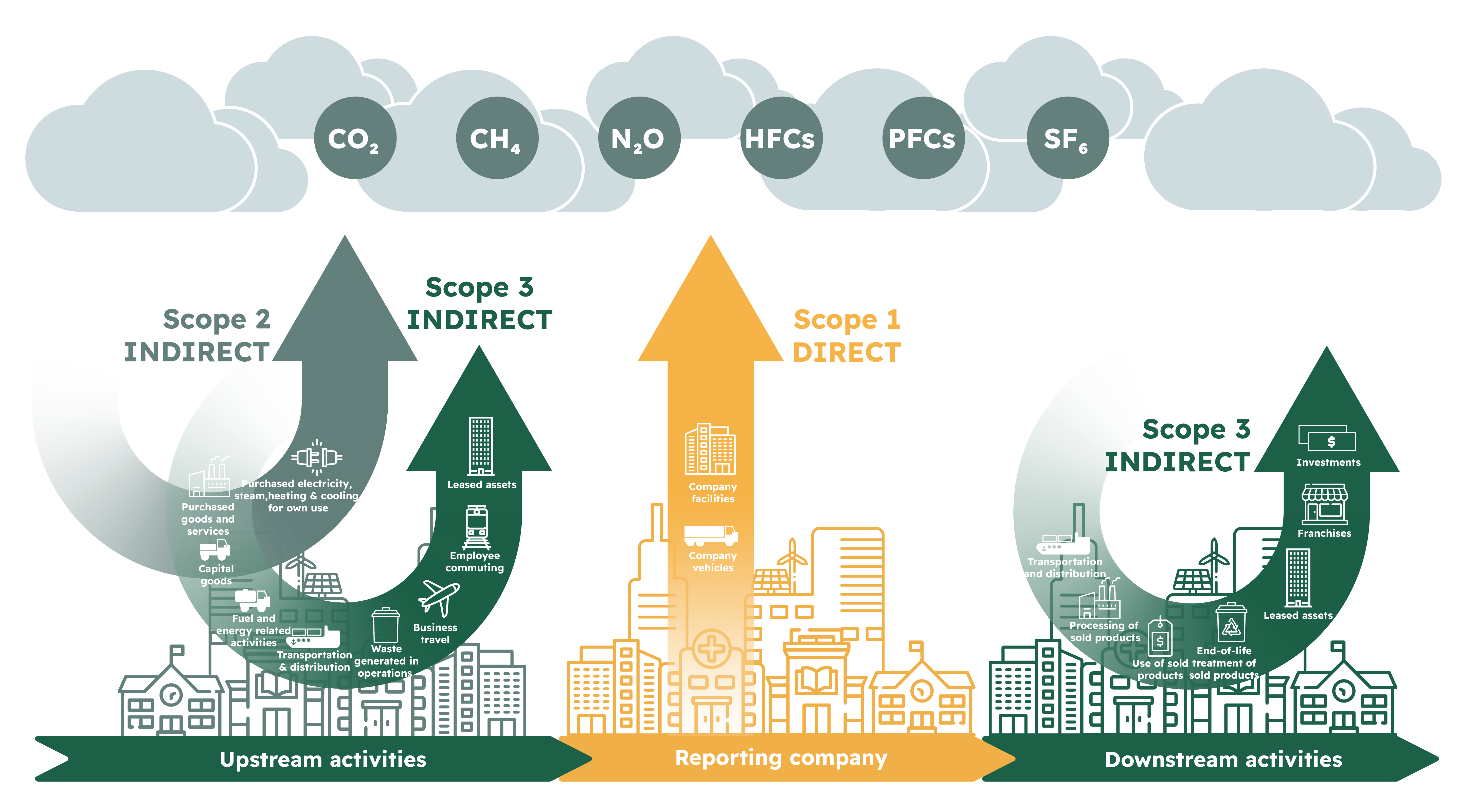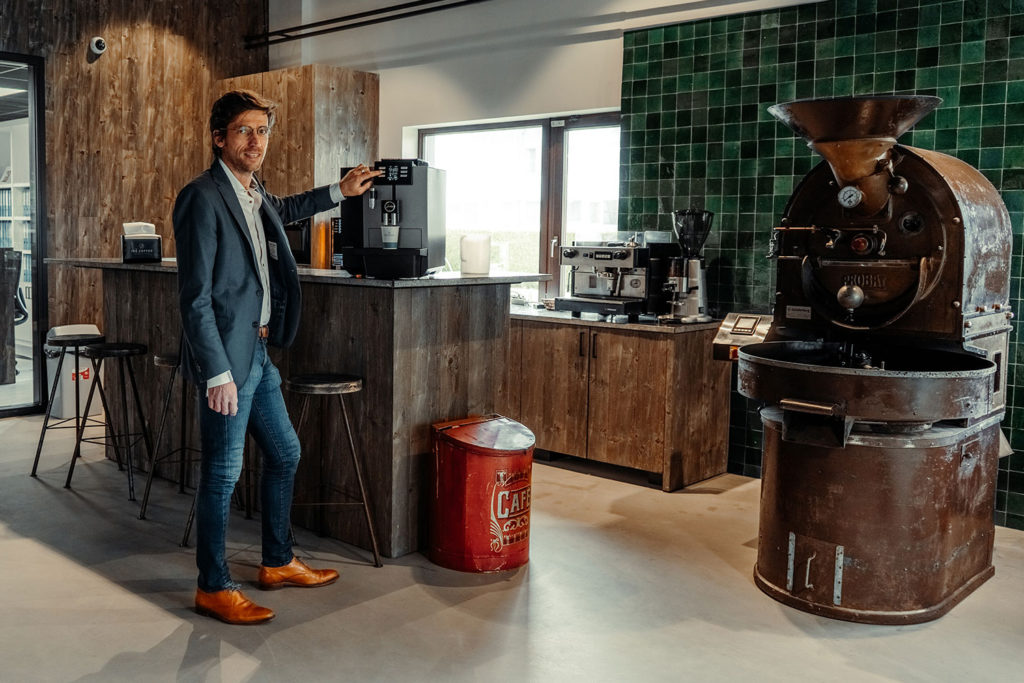Idé Coffee
Maximising sustainable impact as a small business.

How to craft a sustainability strategy within your circle of influence
Idé Coffee is a B2B coffee and coffee machine supplier. While it is a small business with 17 employees, it has big ambitions in the realm of sustainability: by 2030, they want to become the number one sustainable coffee partner for Belgian SMEs (small-to-medium enterprises) within their market segment.
One of the chosen avenues in their trajectory, is reducing carbon emissions throughout their entire value chain. The crux of their challenge? Reducing the majority of CO2 emissions situated within their Scope 3 purchased goods and services. So, what reduction pathways have we drafted, and what concrete actions will be implemented?
Using CO2 analysis to spot improvement areas
To develop an effective sustainability strategy for Idé Coffee, our first step was to accurately assess the company’s current impact. That’s why we started with a complete CO2 analysis, encompassing scope 1, 2 and 3.
- Scope 1: Direct emissions from company-owned or controlled sources (like company vehicles or boilers).
- Scope 2: Indirect emissions from the energy the company buys (such as electricity or heat).
- Scope 3: Indirect emissions from other activities not owned or controlled by the company (like employee travel or waste disposal).
From this analysis, it became clear that the biggest share of Idé Coffee’s carbon emissions currently falls under Scope 3. More specifically, within the purchased goods and services category. As a result, the sustainability strategy that emerged from this analysis strongly focuses on this aspect.
Developing carbon reduction pathways
Based on the CO2 analysis, we helped Idé Coffee define a sustainability strategy, focussing on CO2 reduction. The reduction strategy is built on two main pillars:
- A 90% reduction in CO2 emissions in Scope 1 and 2 by 2028.
- A combination of reduction and compensation of Scope 3. The yearly reduction target for the purchased goods is set at 41 ton of CO2 emissions. This is in line with European goal of reaching climate neutrality by 2050.
In a first phase, the company will focus on Scope 1 and 2 emissions. Actions include acquiring green electricity and switching to electric vehicles for the salesforce.
Next, the focus will be on reducing Scope 3 emissions. This will be achieved with a sustainable purchase policy, and by expanding the rental services with refurbished coffee machines.
Compensating remaining emissions
Compensation, also known as carbon offsetting, is the final step. It is the practice of compensating for carbon emissions by investing in projects that reduce or remove carbon from the atmosphere. This can include initiatives such as reforestation, renewable energy development, or energy efficiency improvements. Carbon compensation is only to be used as a last resort, when a complete reduction is not possible.
For this, a collaboration was established with a local partner, Resurrect. Preference will be given to compensation projects within European borders. Finally, Idé Coffee aims to plant their own forest.
A multi-faceted approach to sustainability is key
A comprehensive sustainability approach considers more than just carbon emissions. The approach that we defined together with Idé Coffee also incorporates elements such as social sustainability and biodiversity.
However, we often find that companies have trouble mastering CO2, understanding what it is about, and how to deal with it. Just this one aspect alone is quite complex. It requires very specific knowledge and intensive time-investment to grasp. That is why we often begin with a CO2 analysis as a starting point, as we did for Idé Coffee. But it is important to remember that it is just that: a starting point.
Reducing scope 3 emissions
Within the coffee machines’ value chain, the biggest contributor to CO2 emissions are the raw materials used to build the coffee machines. Since these machines are purchased, it is not possible for Idé Coffee to directly influence the sourcing of the raw materials. As an SME, a heavy-handed top-down approach, sometimes used by large corporations to force their suppliers to become more sustainable (or risk losing business), is not an option. So, we defined actions within Idé Coffee’s circle of influence:
- Developing and implementing a sustainable purchase policy
- Launching the SecondLife programme, introducing refurbished machines into their offering
The power of a carefully curated purchase policy
Part of our work for Idé Coffee consisted of a very thorough analysis and evaluation of their products and suppliers. We investigated all purchased goods and services to assess their impact in terms of CO2 emissions. This allowed us to identify opportunities for improvement. Items that are not very sustainable, either because of their emissions, or because they are single use, will gradually be phased out and replaced with alternatives, or removed altogether.
The untapped potential of refurbishment
One of the pillars of the European Green Deal in 2020, is a transition to a circular economy, and with good reason. Let’s look at the benefits of integrating refurbishment into Idé Coffee’s business model:
- Diminished dependence on unstable availability of raw materials
- Refurbishing creates new job opportunities
- Less material is needed, leading to a cost reduction
- Reduced carbon footprint because of lower CO2 emissions
- Less waste
- Added value for customers in search of sustainable purchase options of their own
Finetuning a circular business model
Idé Coffee’s existing Product-as-a-Service model, where they offer customers the option to rent coffee machines rather than purchase them, including maintenance and repair, is already circular in nature. But now, they have managed to make this part of their business even more sustainable by offering the choice between new and refurbished machines for rent. Refurbished machines have a lower impact than new machines.
The job opportunities and other benefits that come with refurbishment are kept within the company by organising the refurbishing in-house. Plus, by doing this locally, carbon footprint is reduced even further. This also allows a direct control and exact insight into the CO2 emissions that are inevitable and will be compensated.
By introducing the SecondLife programme, Idé Coffee’s customers now have the option of making an even more sustainable choice and reducing their impact. When operating in a B2B environment, this is a smart business move.
The competitive advantage of sustainability in a B2B market
New sustainability regulations and an increased market awareness are causing the corporate sustainability landscape to evolve quickly. Organisations big and small need to adapt to this new reality, by evaluating the level of sustainability within their organisation, acting where needed, and creating transparency about the process in their reporting.
The SecondLife programme smartly capitalises on this trend. The shift towards more sustainability is often discussed in terms of challenges, but there’s a strong argument to be made for the opportunities it presents as well, as demonstrated here.
How? Idé Coffee’s B2B customer database is unavoidably affected by the changing corporate sustainability landscape and will need to take sustainable action. By offering a viable and easy sustainable alternative, backed with the necessary data and transparent reporting, the coffee supplier is making their customers’ lives easier, and increasing their own chances of success. There are multiple benefits to this approach:
- Standing out from the competition
- Future-proof business
- Positive impact on the environment
What’s next for Idé Coffee?
Conducting an analysis to evaluate Idé Coffee’s current impact, and developing a sustainable improvement strategy, were the building blocks to bring the existing sustainability strategy to a new, more in depth level.
To truly incorporate sustainability even more into the heart of the organisation, and to create effective, lasting change, a long-term commitment to sustainability is crucial. Repetition is a key word here:
- A yearly reiteration of the first baseline CO2 analysis is necessary to track progress of the reduction strategy
- Continuous transparent communication on the progress that is made
Additionally, the company has pledged to take on a leading role in the corporate sustainability transformation. Not just by setting an example, but by investing in education and awareness, both for local companies within their direct environment as for others in the coffee industry. One example of such an initiative is their quarterly ‘Idé Coffee Morning’, where other entrepreneurs are invited to come listen to keynote speakers on a variety of topics surrounding corporate sustainability.
About Idé Coffee
Idé Coffee is a Belgian B2B supplier of coffee, coffee machines, and related products. Since their establishment in 2003, they have continuously aimed to strive for sustainable entrepreneurship. With the support and expert guidance of The Ecological Entrepreneur, they have now taken their sustainability ambitions to the next level. Taking responsibility not only for everything under their own direct influence, but also extending their sustainable impact outwards, towards their suppliers, customers and stakeholders.
What about you?
Need help with your own CO2 analysis and sustainability strategy? Reach out to us!

- Cases
We bring ecology and economy together for your organisation! Choose your sustainable future


